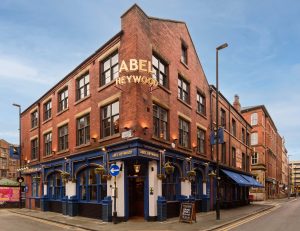New York distressed but not depressed

WE’RE outside the New York Stock Exchange, which for the past half century has represented the epicentre of Western capitalism. Yet our tour guide, Andrew, a former bond trader at Deutsche Bank whose desk made millions shorting his own bank’s dodgy CDOs, argues that the events of the past couple of years mean this building is nowhere near as influential as it once was.
The real power now lies with the nearby Federal Reserve, he says, whose decisions on which banks survived or failed and how many billions of dollars to pump into a faltering economy have had a greater impact than any other organisation.
Indeed, Andrew makes the bold prediction that within five years, New York’s stock exchange could become nothing more than a glorified TV studio.
The city hasn’t had the greatest of recessions. A couple of its banking giants have bitten the dust, the state’s enormous budget deficit ($10bn) has widened and a Citigroup analyst recently estimated that a further 16,000 jobs could follow the 30,000 already lost in its financial district over the past two years. All of which explains the surprising number of voids now present on its prestigious retail thoroughfare, Fifth Avenue.
Yet New York has such a vibrancy and a huge capacity for reinvention – construction work at the new 1 World Trade Center site being the most obvious recent example. And even Andrew’s assertion that the Stock Exchange would be turned over to the TV crews was based on the fact that so much trading is carried out electronically now that there is no point in having bodies on its floors any more. Similarly, many of the surrounding buildings which once housed merchant banks are now luxury apartments.
Even during my brief sojourn to the city – organised by Continental Airlines to promote its new 180° flatbeds in its BusinessFirst service between Manchester and Newark airport – there was plenty of evidence of renewal. Our hotel, the new 294-bed Eventi Hotel in the city’s North Chelsea Village district, is a good example of this.
It was so new that neither its bar not its futuristic-looking restaurant (designed by a set designer who worked the Blade Runner movie) have opened yet, nor had the grand gastro foodcourt project known as FoodParc.
The hotel’s operator, Kimpton, seems unfazed by the economic climate nor the short-term drop in visitor numbers experienced by the city last year, when numbers fell for the first time in almost a decade by 1.4m . It sales manager said that the building’s owner, Credit Suisse, books more than 20,000 rooms in New York each year – almost ten times as many as it does in its Geneva headquarters.
Other signs of improvement include The High Line – a former stretch of elevated
In fact, there was so much new stuff to see and do – even for a group who had been to the city before – that by the end of three hectic days of running around the flat bed proved to be a godsend on the way home. And it worked – although I ordered dinner, I was asleep before it arrived and didn’t wake until breakfast several hours later.
Information:
BusinessFirst flatbeds are currently available on half of Continental Airline’s 757s operating twice-daily between Manchester and Newark airports, and will be installed on all of its fleet by next May. Typical prices are £1,972 for the BusinessFirst service and around £363 for economy.
The Eventi Hotel is on the corner of 6th Avenue and West 30th St. Visit www.eventihotel.com for more details.








